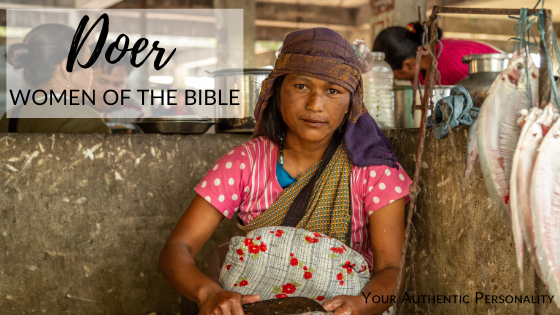Doer Women of The Bible
January 14, 2025
Doer Women of The Bible

Who is the first female Doer you think of in the Bible?
MARTHA
Did Martha come to mind?
It seems every Bible teacher on earth has preached a sermon about Martha’s propensity for doing versus Mary’s choice for being. Mary is always the good girl because she sat at Jesus’ feet while Martha is the bad girl because she “was very busy and distracted with all of her serving responsibilities.” But in defense of Martha, I agree with Emily P. Freeman who said Martha valued Jesus’ company in the way she knew how (Grace for the Good Girl). In true Doer form, Martha loved Jesus by what she did for him, and honored him with her tasks. While we don’t want to lose sight of our strengths, Martha reminds us that some things are more important than work.
SARAH
I believe Sarah, wife to Abraham (quintessential Stabilizer), was a Doer too. In Genesis, we see how she struggled with the classic Doer weakness of impatience as she endured a 25 year season of infertility (absolutely excruciating for a Doer), waiting and waiting for God to deliver on His promise of a baby. You can see her Doer nature in the way she finally took action by giving her slave girl, Hagar, to her husband, and mistakenly believing that it was her responsibility to do so. At that point she looked upon God as an obstacle in her path (Doers are all about overcoming obstacles) when she said to her husband, “The Lord has kept me from having children. Go, sleep with my slave; perhaps I can build a family through her.” (Genesis 16:2). Oh Sarah, you powerful Doer, it wasn’t all up to you. God had a plan, although I’ll admit, it was a very slow plan, and He always intended to (and did indeed) provide for you.
DEBORAH
Deborah, was the fourth judge of pre-monarchic Israel and the only female judge recorded in the Bible (Judges 4-5). We see her Doer qualities in the form of her leadership, strength, and high energy. Her name, which means “bee,” was spot on, considering how busy she must have been. Deborah, the consummate multi-tasker, was a wife, a prophetess, an agitator, a ruler, a warrior, a poetess, and a maternal figure. She led the Israelites in a battle against the vast Canaanite army and won. She offered sage advice to other leaders. (Doers love to tell people what to do.) Deborah was a motivator and a “get it done” woman who prophesized on behalf of God. What didn’t this gal do?
RAHAB
Rahab, too, seems like a Doer. Yes, she was a prostitute (Joshua 2), an unfortunate profession for any woman, but she was also the great great great grandmother of our Lord, Jesus Christ. Rahab means “fierceness,” a quality synonymous with the power and might that was not often associated with women in biblical times. You go girl. But this woman was bold and decisive. When the Jewish spies came to her for help, she feared God more than men (smart girl) and, at risk to her own life, devised a plan to hide them and eventually help them escape. The Bible records that she was “justified by works” (James 2:25) through her actions. She sounds like a Doer through and through.
JEZEBEL
Jezebel, the Baal worshipping queen of Israel seems to be a Doer who lived out of her weaknesses rather than her strengths. In her book Bad Girls of the Bible, Liz Curtis Higgs bottom lines her Doer qualities for us:
She used her bright mind to devise evil schemes.
She used her courage to commit murder.
She used her leadership skills to take over the throne.
She used her assertiveness to draw people away from God.
She used her queenship to manipulate her subjects.
Jezebel was made in the image of God but she choose not to mirror God’s likeness. Instead, she sought glory for herself. She died a humiliating death. The lesson here for Doers is to seek God so you can live out of your personality strengths rather than your natural weaknesses.
LYDIA
In sharp contrast to Jezebel, Lydia—another suspected Doer—used her influence for the glory of God. Lydia, found in Acts 16, was a successful business owner (Doers are often entrepeneurs and leaders in business) who imported purple cloth and managed a household filled with servants. But unlike many business people, work did not rule her. She made time for God in her busy schedule and as a result was the first person recorded in the Bible to have been saved in Europe.
As you can see Doers can live out of their strengths or their weaknesses and to varying degrees. Women like Deborah and Lydia represent Doers who beautifully reflect God’s power and might while women like Jezebel and Martha (especially under pressure) show us what can happen when a Doer’s strengths go south. The goal for all Doers is to steward their God-given gifts and talents for the good of others and to seek God’s help when those strengths have morphed into weaknesses.
For more information on a Doer’s strengths, weaknesses, leadership style, anger trigger, and self care needs check out the Doer ebook.




